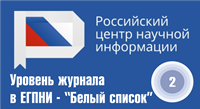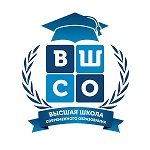ЦИФРОВАЯ ОБРАЗОВАТЕЛЬНАЯ СРЕДА КАК УСЛОВИЕ ЭФФЕКТИВНОЙ ПОДГОТОВКИ КАДРОВ ДЛЯ ИННОВАЦИОННОЙ ЭКОНОМИКИ
Аннотация
Исследование сосредоточено на формировании цифровой образовательной среды (ЦОС) как ключевого фактора подготовки кадров, способных успешно функционировать в инновационной экономике.
Цель исследования. Исследование рассматривает проблемы, связанные с быстро развивающимся цифровым бизнес-ландшафтом, подчеркивая необходимость адаптации образовательных учреждений к созданию конкурентоспособной ЦОС. Основная цель – определить ключевые направления разработки ЦОС, которая эффективно подготовит студентов к требованиям цифровой экономики.
Материалы и методы. В рамках настоящего исследования использовались различные методы, включая системный и функциональный подходы, экспертные оценки и статистический анализ для оценки потенциала образовательной среды в подготовке специалистов для цифрового бизнеса. Применён метод кейс-стади в образовательном процессе Севастопольского государственного университета. Представлен сравнительный анализ традиционных методов преподавания и модели смешанного обучения.
Результаты. Сделаны выводы о том, что хорошо спроектированная ЦОС, использующая такие платформы, как Moodle (Modular Object-Oriented Dynamic Learning Environment), является необходимой для подготовки будущих специалистов в цифровой экономике. Полученные результаты исследования рекомендуется использовать в схемах дополнительного профессионального обучения, трудоустройства и переподготовки кадров с целью повышения общепрофессиональной компетентности специалистов.
EDN: SDTYXF
Скачивания
Литература
References
Akimova O.B., Shcherbin M.D. Digital transformation of education: timeliness of educational and cognitive independence of students. Sovremennye tekhnologii v obrazovanii: opyt i puti realizacii [Innovative Projects and Programs of the Education], 2018, no. 1, pp. 27-34.
Gevorkyan A.R. Digital educational environment: New opportunities for the modern college teacher. Sovremennye tekhnologii v obrazovanii: opyt i puti realizacii [Modern Technologies in Education: Experience and Ways of Implementation], 2019, no. 1, pp. 30-34.
Mirontseva S.S., Spirina Yu.P., Nikitina E.V. Formation of foreign language competence of students majoring in the humanities using a distance learning system. Nauchnoe mnenie [The Scientific Opinion], 2022, no. 5, pp. 120-127. https://doi.org/10.25807/22224378_2022_5_120
Mirontseva S.S. Formation of a foreign language professionally oriented competence of future managers using electronic educational resources. PhD dissertation. Grozny, 2019, 212 p.
Mirontseva S.S., Sivtseva A.S. Formation of English-language linguo-sociocultural competence through immersive technologies. Obrazovatel'noe prostranstvo v epohu informatizacii: sbornik nauchnyh statej Mezhdunarodnoj nauchno-prakticheskoj konferencii [Educational Space in the Information Era]. Moscow: Institute for Education Development Strategy of the RAE, 2022, pp. 481-496.
Prirodova O.F., Danilova A.V., Morgun A.N. Digital educational environment structure: Regulatory legal and methodological aspects. Pedagogika i psihologiya obrazovaniya [Pedagogy and Psychology of Education], 2020, no. 1, pp. 9-30. https://doi.org/10.31862/2500-297X-2020-1-9-30
Spirina Yu.P. Pedagogical conditions for the development of foreign language professionally oriented competence of future economists in the context of e-learning. Municipal'noe obrazovanie: innovacii i eksperiment [Municipal Education: Innovation and Experiment], 2023, no. 3(100), pp. 188-191. https://doi.org/10.51904/2306-8329_2022_83_2_21
Electronic training course «English for Economists». URL: https://do.sevsu.ru/course/view.php?id=3273 (accessed August 30, 2024).
Al-Gindy A., Yasin N., Aerabe M., Omar A.A.C. Integrating digital technology in enterprise and entrepreneurship education. Technology and entrepreneurship education. Cham: Palgrave Macmillan, 2022, pp. 53-75. https://doi.org/10.1007/978-3-030-84292-5_3
Altukhova N., Vasilyeva E. The ecosystem of training the future leaders of the digital world: Results of the inclusion of «Internet entrepreneurship» in the educational program of the University of Economics. Communications in Computer and Information Science, 2021, vol. 1204, pp. 57-66. https://doi.org/10.1007/978-3-030-78273-3_6
Klyayner G.B. University as an ecosystem: Institutes of interdisciplinary management. Journal of Institutional Studies, 2019, vol. 11(3), pp. 054-063. https://doi.org/10.17835/2076-6297.2019.11.3.054-063
Koskivaara E., Somerkoski B. Alumni reflections on gender equality in the ICT context. Lecture Notes in Computer Science, 2020, pp. 380-386. https://doi.org/10.1007/978-3-030-45002-1_33
Kurzayeva L., Chusavitina G., Zerkina N., Davletkireeva L., Votchel L. Aspects of requirements elaboration to basic competences of a personality in the digital economy environment. Communications in Computer and Information Science, 2021, vol. 1204, pp. 34-44. https://doi.org/10.1007/978-3-030-78273-3_4
Lyapuntsova E.V., Lazareva O.V., Drozdova I.I., Belozerova Yu.M., Danilina A.V. Digital Educational Environment for Business: Risks and Trends of Sustainable Development. Lecture Notes in Networks and Systems, 2022, vol. 380, pp. 726-730. https://doi.org/10.1007/978-3-030-94245-8_99
Mitrofanova E.A., Simonova M.V., Tarasenko V.V. Potential of the education system in Russia in training staff for the digital economy. Advances in Intelligent Systems and Computing, 2020, vol. 908, pp. 463-472. https://doi.org/10.1007/978-3-030-11367-4_46
Reale J., O’Brien E., Ceallaigh T.J., Connolly C. A third space: Infusing open educational resources (OER) with universal design for learning (UDL). Inclusive Digital Education. Educational Communications and Technology: Issues and Innovations. Springer, 2022, pp. 13-25. https://doi.org/10.1007/978-3-031-14775-3_2
Skoblyakova I.V., Semenova E.M., Zakharov A.V., Tokmakova E.N., Morozova O.I. Training of innovative personnel in the digital economy. Lecture Notes in Networks and Systems, 2021, vol. 200, pp. 683-692. https://doi.org/10.1007/978-3-030-69421-0_73
Suleymankadieva A.E., Petrov M.A., Popazova O.A., Gridneva M.A., Molodkova E.B. Digital educational ecosystem: Transformation and development trends of online education. Lecture Notes in Networks and Systems, 2022, vol. 380, pp. 692-697. https://doi.org/10.1007/978-3-030-94245-8_94
Taranukha S., Savelyeva M., Fomina I. Development of a conceptual model of the digital ecosystem of students based on the transformation of the electronic information and educational environment of the transport university. Lecture Notes in Networks and Systems, 2022, vol. 402, pp. 1333-1341. https://doi.org/10.1007/978-3-030-96380-4_148
Список литературы
Акимова О.Б., Щербин М.Д. Цифровая трансформация образования: своевременность учебно-познавательной самостоятельности обучающихся // Инновационные проекты и программы в образовании. 2018. № 1. С. 27-34.
Геворкян А.Р. Цифровая образовательная среда: новые возможности для современного преподавателя колледжа // Современные технологии в образовании: опыт и пути реализации. 2019. №1. С. 30-34.
Миронцева С.С., Спирина Ю.П., Никитина Е.В. Формирование иноязычной компетенции обучающихся гуманитарных специальностей с помощью системы дистанционного обучения // Научное мнение. 2022. № 5. С. 120-127. https://doi.org/10.25807/22224378_2022_5_120
Миронцева С.С. Формирование иноязычной профессионально-ориентированной компетенции будущих менеджеров с использованием электронных образовательных ресурсов: Дис. … канд. пед. наук. Грозный, 2019. 212 с.
Миронцева С.С., Сивцева А.С. Формирование англоязычной лингвосоциокультурной компетенции с использованием иммерсивных технологий // Образовательное пространство в эпоху информатизации: сборник научных статей Международной научно-практической конференции, Москва, 07–08 июня 2022 г. / Под ред. С.В. Ивановой, И.М. Елкиной. М.: Институт стратегии развития образования РАО. 2022. С. 481-496.
Природова О.Ф., Данилова А.В., Моргун А.Н. Структура цифровой образовательной среды: нормативно-правовые и методологические аспекты // Педагогика и психология образования. 2020. №1. С. 9-30. https://doi.org/10.31862/2500-297X-2020-1-9-30
Спирина Ю.П., Миронцева С.С. Педагогические условия развития иноязычной профессионально ориентированной компетенции будущих экономистов в условиях электронного обучения // Муниципальное образование: инновации и эксперимент. 2022. № 2(83). С. 21-28. https://doi.org/10.51904/2306-8329_2022_83_2_21
Электронный учебный курс «English for Economists». URL: https://do.sevsu.ru/course/view.php?id=3273 (дата обращения: 30.08.2024).
Al-Gindy A., Yasin N., Aerabe M., Omar A.A.-C. Integrating digital technology in enterprise and entrepreneurship education // Technology and entrepreneurship education. Cham: Palgrave Macmillan, 2022, pp. 53-75. https://doi.org/10.1007/978-3-030-84292-5_3
Altukhova N., Vasilyeva E. The ecosystem of training the future leaders of the digital world: Results of the inclusion of “Internet entrepreneurship” in the educational program of the University of Economics // Communications in Computer and Information Science, 2021, vol. 1204, pp. 57-66. https://doi.org/10.1007/978-3-030-78273-3_6
Klyayner G.B. University as an ecosystem: Institutes of interdisciplinary management // Journal of Institutional Studies, 2019, vol. 11(3), pp. 054-063. https://doi.org/10.17835/2076-6297.2019.11.3.054-063
Koskivaara E., Somerkoski B. Alumni reflections on gender equality in the ICT context // Lecture Notes in Computer Science, 2020, pp. 12067, 380-386. https://doi.org/10.1007/978-3-030-45002-1_33
Kurzayeva L., Chusavitina G., Zerkina N., Davletkireeva L., Votchel L. Aspects of requirements elaboration to basic competences of a personality in the digital economy environment // Communications in Computer and Information Science, 2021, vol. 1204, pp. 34-44. https://doi.org/10.1007/978-3-030-78273-3_4
Lyapuntsova E.V., Lazareva O.V., Drozdova I.I., Belozerova Yu.M., Danilina A.V. Digital educational environment for business: Risks and trends of sustainable development // Lecture Notes in Networks and Systems, 2022, vol. 380, pp. 726-730. https://doi.org/10.1007/978-3-030-94245-8_99
Mitrofanova E.A., Simonova M.V., Tarasenko V.V. Potential of the education system in Russia in training staff for the digital economy // Advances in Intelligent Systems and Computing, 2020, vol. 908, pp. 463-472. https://doi.org/10.1007/978-3-030-11367-4_46
Reale J., O’Brien E., Ceallaigh T.J., Connolly C. A third space: Infusing open educational resources (OER) with universal design for learning (UDL) // Inclusive Digital Education. Educational Communications and Technology: Issues and Innovations. Springer, 2022, pp. 13-25. https://doi.org/10.1007/978-3-031-14775-3_2
Skoblyakova I.V., Semenova E.M., Zakharov A.V., Tokmakova E.N., Morozova O.I. Training of innovative personnel in the digital economy // Lecture Notes in Networks and Systems, 2021, vol. 200, pp. 683-692. https://doi.org/10.1007/978-3-030-69421-0_73
Suleymankadieva A.E., Petrov M.A., Popazova O.A., Gridneva M.A., Molodkova E.B. Digital educational ecosystem: Transformation and development trends of online education // Lecture Notes in Networks and Systems, 2022, vol. 380, pp. 692-697. https://doi.org/10.1007/978-3-030-94245-8_94
Taranukha S., Savelyeva M., Fomina I. Development of a conceptual model of the digital ecosystem of students based on the transformation of the electronic information and educational environment of the transport university // Lecture Notes in Networks and Systems, 2022, vol. 402, pp. 1333-1341. https://doi.org/10.1007/978-3-030-96380-4_148
Просмотров аннотации: 106
Copyright (c) 2024 Tatyana N. Korzh, Aleksadra S. Sivtseva, Svetlana S. Mirontseva, Yuliya P. Spirina, Ekaterina V. Nikitina

Это произведение доступно по лицензии Creative Commons «Attribution-NonCommercial-NoDerivatives» («Атрибуция — Некоммерческое использование — Без производных произведений») 4.0 Всемирная.






































